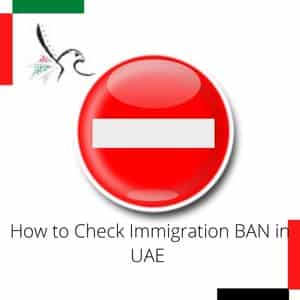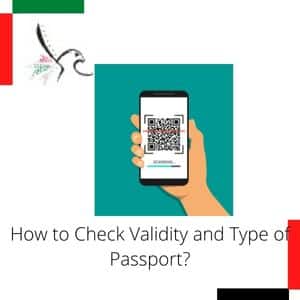Traveling to the UAE can be a wonderful experience, but there are a few things that you need to do before your trip in order to make sure that everything goes smoothly. The first thing you should do is check the visa requirements for your destination country, as some countries require a visa in order to enter.
You can find this information on the website of the UAE’s Ministry of Foreign Affairs and International Cooperation.

In addition, it is important to learn about the local laws of the UAE and the country you are visiting. Remember that ignorance of the law is not an excuse, so it is important to be aware of what is legal and what is not.
Finally, make sure to purchase travel insurance before your trip. This will help protect you in case of any unexpected medical expenses or problems while abroad. This is all very well but how to know if you are BAN to enter the UAE. In this article we will tell you everything you need. Stay tuned.
Contents
- 1 What is a Travel Ban?
- 2 Reasons for the UAE Travel Ban
- 3 Check if you Have a Travel BAN UAE
- 4 How to check UAE ban status with passport number in Abu Dhabi Emirate?
- 5 How to Check Validity and Type of Passport?
- 6 Check Visa Requirements
- 7 Recommendations
- 8 How long will it take to lift the travel ban in the UAE?
- 9 How much does it cost to lift a ban in the UAE?
- 10 Conclusion
What is a Travel Ban?
A travel ban is an official restriction preventing an individual from leaving or entering a country. This is enforced at all entry and exit points and is typically accompanied by a court or police order. It’s used for various reasons such as ensuring child custody, addressing financial defaults, or aiding criminal investigations. If under a travel ban, a person cannot leave the country and might be detained upon attempting entry into another country.
Reasons for the UAE Travel Ban
The UAE imposes travel bans to maintain safety and prevent adverse situations. Common reasons include:
- Criminal Investigation: A ban is placed if you’re under investigation in any country.
- Immigration Violations: Violating immigration laws leads to a ban.
- Financial Debt: Outstanding debts can trigger a ban.
- No Legal Work Visa: Entering or leaving the UAE without a valid work visa.
- Rent Conflicts: Unresolved rental disputes can result in a ban.
- Overstaying on the Visa: Staying beyond the visa expiry date.
- Health Issues: Outbreaks like COVID-19 or cholera can initiate a ban.
Types of UAE Travel Ban
The UAE categorizes travel bans based on their nature:
- Immigration Bans: Permanent or temporary bans due to legal cases, overstays, debts, or criminal activities.
- Financial Bans: Linked to unresolved financial obligations.
- Employment Bans: Resulting from breached employment contracts or regulations.
- Criminal Bans: For serious offenses, barring entry into the UAE.
Each type of ban has specific implications, with durations varying from temporary to lifetime.
Check if you Have a Travel BAN UAE
If you are interested in traveling to the UAE, it is important to check if you have any travel bans. The Dubai Police has an online free-of-charge service that allows residents in the UAE to check if they have a travel ban due to financial cases in Dubai. To use the service, you need to enter your Emirates ID card number.
Call the Dubai Police on 901 for further information. For more information, go to the Dubai Police website or download the Dubai Police app from iTunes and Google Play. Call 901 if you have any questions.
The Judicial Department in Abu Dhabi also has an online service called ‘Estafser’. This service enables residents of Abu Dhabi to check whether they are requested by the Public Prosecution for any claims against them.
To use the service, requester must enter his/her unified number.
It is also advisable to check and/or solve any issues that might stop you at the airport immigration counters before planning your travel. If necessary, you may seek the assistance of a lawyer, or contact the nearest immigration/police office in your area for an advice.
How to check UAE ban status with passport number in Abu Dhabi Emirate?
To find out if you have a travel ban in Abu Dhabi, you can utilize the ‘Estafser’ service from the Abu Dhabi Department of Justice. This service allows you to check for any travel restrictions using your passport number, specifically within the Abu Dhabi Emirate.

How to Check Validity and Type of Passport?
If you are a traveller with a valid passport, make sure that it is a machine-readable or ePassport to travel to certain countries. The General Directorate of Residency and Foreigners Affairs in the UAE can help you check the validity of your passport.

Meanwhile, expatriate residents in UAE may contact their embassies and consulates in the UAE for more information on passports. If you have any questions about travelling abroad, you can contact the Ministry of Foreign Affairs and International Cooperation through their call centre.
The Ministry of Foreign Affairs and International Cooperation or a call center on (80044444) can be contacted for any questions regarding traveling abroad.
You may find the following links helpful:
- The Emirati ePassport– UAE Government portal
- Applying for UAE passport – UAE Government portal
Check Visa Requirements
If you are a citizen or resident of the UAE, it is important to check the visa requirements for the country you will be traveling to. This includes contacting the foreign mission of the destination country in the UAE, as well as checking with private company VFS Global.
There are many countries that exempt Emiratis from applying for a visa, but there are some that require you to have one before traveling. And if you do need a visa, you may be able to get it when you arrive at your destination.
Visa for UAE citizens
Emiratis can visit numerous countries without a visa or by obtaining a visa on arrival. Emiratis may find out whether they are eligible to apply for a visa or whether they need one before traveling, as well as if they will require one upon arrival.
Recommendations
✅ Check the travel advisories: If you’re looking to travel to one of the countries on the list, be sure to check the travel advisories first to see if it’s safe. The UAE’s Ministry of Foreign Affairs and International Cooperation publishes travel warnings for countries around the world that may be unsafe for tourists. So before booking your flight, make sure to check the website to see if your destination is on the list.
✅ Learn about local laws: Before you go, learn about the country’s legal and cultural norms. Remember that ignorance of the law is not a defense, and that if you commit an offense you would be liable to prosecution.
Many countries across the globe have different laws surrounding religious or cultural garb such as the burqa, hijab, or niqab. For example, France, Belgium and The Netherlands have banned veils altogether. Veils are also outlawed in Thiessen Canton of Switzerland, Barcelona in Spain, the Hesse State in Germany and several Italian cities. If caught violating these laws, people would be subjected to a fine.
How long will it take to lift the travel ban in the UAE?
If all the requirements are correct and reasonable after checking, the ban removal application will be processed within five working days. If approved, the travel ban will be lifted. Or you can follow the request process online. In addition, some travel bans usually last for one year and will be automatically lifted at the end of the period.
How much does it cost to lift a ban in the UAE?
It is completely free to lift the ban when these conditions are met. So you must make sure that you have resolved all the issues of the ban and travel freely to the UAE.
Conclusion
Plan your travel thoroughly before you go to avoid any issues at the airport immigration counters. If necessary, seek legal assistance or contact the nearest immigration/police office in advance for advice.
If you are certain that your current situation is correct and you should not be BAN’d, you can request BAN cancellation at this link.
✅ Request cancellation of a travel ban order– Ministry of Justice.
It is important to always do your research before traveling and be aware of the laws in the country you are visiting. It is also crucial to plan your travel thoroughly, so that any issues at the airport can be avoided. If you have any questions or concerns, it is best to reach out to an immigration lawyer or local police office for advice.

Hi, I’m Sharif and this is my website where I offer information and advisory services in the United Arab Emirates. I invite you to read and comment on my articles. If you want to know more about my visit, about me .